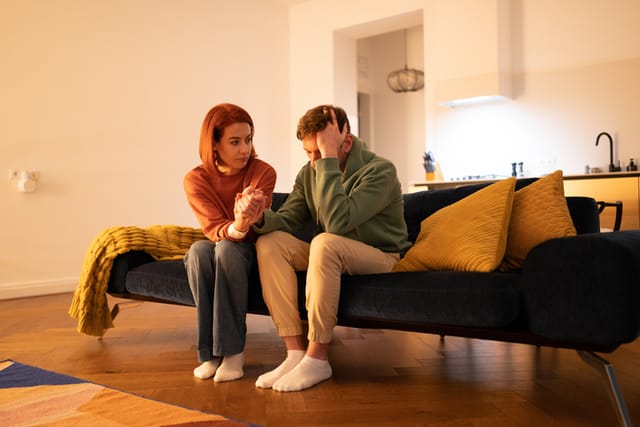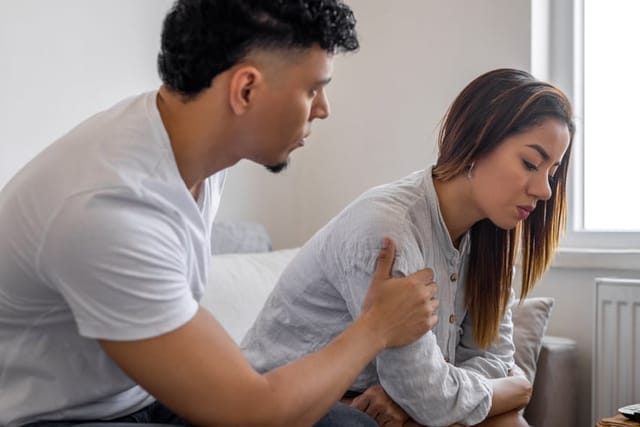When you do something wrong, you apologize — it’s pretty much the oldest social etiquette rule in the book. However, “I’m sorry” means nothing if the person saying it isn’t sincere and is just trying to cover their back or brush a situation under the rug. So, how can you tell whether or not an apology is genuine? Look for these signs.
1. They acknowledge what they did wrong.

A real apology doesn’t dance around the issue. It’s a straight-up acknowledgment of what they did wrong — no beating around the bush, no vague references. They should clearly state what they did to show that they understand the impact of their actions and prove they’re not just apologizing because they got caught or feel cornered.
2. There are no “but”s.

Genuine apologies don’t come with a “but.” The moment you hear “I’m sorry, but…” you should know that it’s an excuse in disguise. It’s a way of shifting blame or justifying their actions. A true apology stands alone, without excuses or attempts to deflect blame onto someone or something else.
3. They understand the impact of their actions.

Someone offering a real apology will demonstrate they understand how what they did affected you. They won’t just say sorry for the sake of it; they’ll show they get why you’re upset or hurt. It’s about empathy. If they don’t get why you’re upset, then they’re not really sorry. (BTW, if you want to find a relationship with someone who’s more genuine in how they make amends when they mess up, check out our sister site, Sweetn. Their research-backed tips, tricks, and advice will totally change your love life in just a few weeks.)
4. They take full responsibility and don’t try to shirk the blame.

Watch out for attempts to share the blame or point out where you went wrong as well. A genuine apology means owning up to their part in the issue, not diluting it by pointing fingers at you or anyone else. “We both got heated” is not an apology; it’s a cop-out. While it may be true, you’re fully capable of ‘fessing up to your own part in things.
5. Their tone and body language actually seem sincere.

This one’s about gut feeling. Does the apology feel sincere, or does it feel like they’re just going through the motions? Pay attention to their tone of voice and body language. Are they making eye contact? Do they seem genuinely remorseful? Or does it feel like they’re just ticking a box?
6. They don’t use passive-aggressive language.

“I’m sorry you feel that way” is not an apology. It’s a classic example of passive-aggression. A genuine apology focuses on their actions, not your reaction. It acknowledges the wrong, not just your response to it. If the person saying they’re sorry does so using “I” statements rather than “you,” they’re on the right path.
7. They don’t make the situation about them.

Suddenly turning themselves into the victim is a red flag. “I’m sorry, but I’ve been under a lot of stress…” is them making excuses and shifting the focus to their feelings. An apology should be about how they hurt you, not about their own issues. Sure, you can take the situation into consideration, but that doesn’t make up for what they did.
8. They have a solution or a way to make it up to you.

A real apology often comes with a plan to fix things or make amends. It shows they’re serious about righting their wrong and not just offering empty words. If they’re just saying sorry without any intent to change or make it up to you, question their sincerity. They need to come equipped with a game plan.
9. They don’t expect you to forgive them immediately.

Genuine apologies don’t come with the expectation of instant forgiveness. They understand that healing takes time. If someone is pressuring you to accept their apology and move on, they’re more interested in clearing their conscience than in your actual forgiveness.
10. They show consistent improvement over time.

One apology means nothing if their actions don’t change. If they’re genuinely sorry, you’ll see a consistent effort to do better. If they revert back to their old ways, that apology was just lip service. Actions speak louder than words, as they say.
11. They respect your need for space.

After messing up, a genuinely remorseful person will respect your need for space and time to process. They won’t badger you for acceptance or pretend like nothing happened. They’ll give you room to breathe and to think about their apology so you can come back to them in your own time.
12. They don’t use the good stuff they’ve done in the past as leverage.

“But remember when I…” is not part of a genuine apology. Bringing up past good deeds as a way to excuse bad behavior is manipulative. It’s a way of guilt-tripping you into accepting the apology. So what if they did nice things for you in the past? Isn’t that what you naturally do for people you care about?
13. Their apology matches the magnitude of the mistake.

The scale of the apology should match the scale of the mistake. A major betrayal requires more than a quick “my bad.” If they’re not taking the severity of their actions seriously, neither should you take their apology seriously.
14. They don’t try to gaslight you.

Genuine apologies don’t include phrases that make you question your reality or feelings. “You’re overreacting” or “That’s not what happened” are signs of gaslighting, not remorse. Instead, they should not only acknowledge but validate your feelings while recognizing that they’re the one that caused them.
15. They’re open to having an actual discussion.

A real apology opens the door for further conversation. It’s not just a statement; it’s an invitation to talk about what happened and how to move forward. If they’re shutting down any further discussion, they’re not truly sorry.
Enjoy what you’ve read? Give us a like and follow Bolde on MSN for more!



